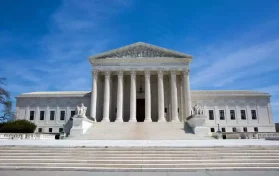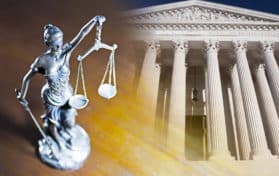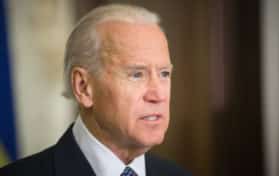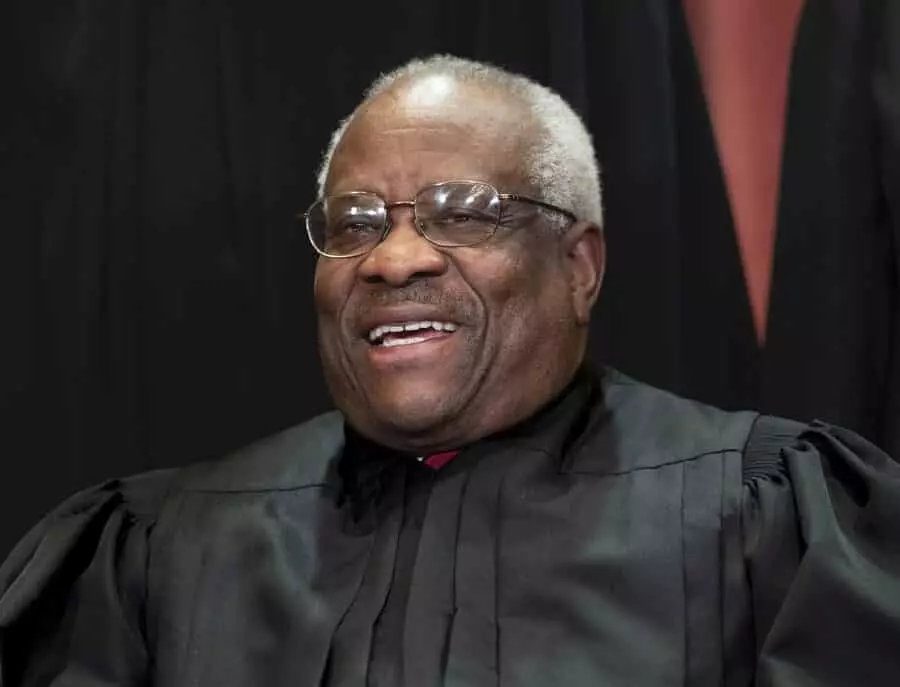
Clarence Thomas is a long-serving justice on the land’s highest court, the Supreme Court. Thomas has the most conservative voting record, and, according to Cornell University’s Oyez, Thomas is one of the most stoic justices on the court. He is know for not asking many questions during oral arguments. He is only the second African American justice to sit on the Court. Thomas’ nomination is one that is memorable as he was accused of sexual harassment by a former employee at the Equal Employment Opportunity office. However, the Federal Bureau of Investigation found the woman’s accusations “inconclusive,” and the Senate hearings would eventually lead to Thomas’ confirmation. During his time as a Justice, Thomas has proven to be a a “Constitutional originalist.” This means that Thomas believes the Constitution is to be interpreted as it was written “given the original public meaning that it would have had at the time that it became law.”
| Celebrated Name: | Clarence Thomas |
| Real Name/Full Name: | Clarence Thomas |
| Gender: | Male |
| Age: | 73 |
| Birthdate: | June 23, 1948 |
| Birthplace: | Pin Point, GA |
| Nationality: | American |
| Height: | 5 ft. 9 in. |
| Weight: | 172 lb. |
| Sexual Orientation: | Straight |
| Marital Status: | Married |
| Wife/Spouse | Virginia “Ginny” Thomas (m. 1987) Lamp; Kathy Ambush (m. 1971 – 1984) |
| Children/Kids: | One son, Jamaal |
| Dating/Girlfriend Name: | N/A |
| Is Clarence Thomas Gay? | No |
| Highest Political Office: | United States Supreme Court Associate Justice |
| Profession: | attorney, federal judge |
| Colleges Attended: | College of the Holy Cross; Yale University |
| Degrees: | English literature (BA); Juris Doctor |
| Salary: | $220,000 |
| Net Worth in 2022: | approximately $1 million |
Biography: Early Life and Family
Clarence Thomas was born during the Jim Crow era in Georgia. His parents had the same jobs as many Southern blacks did at the time; his father worked on a farm and his mother was a “domestic.” Thomas is able to trace his lineage to slaves named Sandy and Peggy; his family spoke “Gullah” – a Creole language that has an English basis, but influences from the West Indies as well.
Thomas’ early life was one of hard times. His mother was left to raise Clarence and his siblings on a salary that paid very little. After their family home burned, Clarence went to live with his grandparents, who laid a strong foundation in the person Clarence Thomas would become. Thomas has referred to his grandfather as “the greatest man I have ever known.”
One of the areas where Thomas’ grandfather proved heavily influential was in promoting the importance of an education in young Clarence. Clarence Thomas attended two different Catholic schools. Upon graduation, Clarence originally intended to go into the ministry, but, a nun at the Conception Seminary College encouraged Thomas to enroll a the College of the Holy Cross.
Thomas decided to major in English literature due to his first language, Gullah. According to Thomas, he decided (when he spoke) it “still sounded unpolished,” so he chose to take up that major in an effort “to conquer the language.” Thomas would later graduated from the College of the Holy Cross with honors.
Clarence Thomas later enrolled at Yale to earn his Juris Doctor. Thomas has been outspoken about his education there. Even though he earned fairly good grades, Thomas had a hard time getting a job with a law firm because many potential employers believed he had only been able to get into law school due to affirmative action.
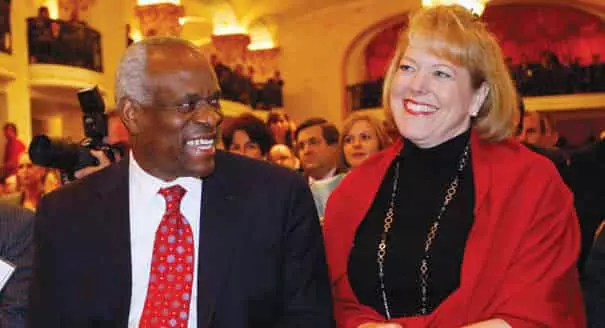
Personal Life
Clarence Thomas has been married twice, and has one son by his first marriage. He married a woman he met during his college days, Kathy Ambush, in 1971. The couple separated in 1981, but would not be officially divorced until 1984. Thomas married a second time in 1987, to Virginia “Ginni” Lamp.
Ginni was a lobbyist when the pair married. Her work has been the cause of some controversy for Justice Thomas. Critics point to social media posts on Ginni’s personal page, and they hint that Ginni’s stance on politics could sway her husband’s Supreme Court rulings.
Ginni is a consultant for the Heritage Foundation, and she founded a lobbying group called Liberty Central. Today, Ginni heads up a lobbying firm, Liberty Consulting. She is still outspoken about her conservative views.
Ginni and Clarence took in Thomas’ nephew, whom they have raised.
Age, Height, and Weight
Clarence Thomas is 73 years of age. He is 5′ 9″ in height, and he weighs approximately 172 lbs.
Net Worth
Clarence Thomas is estimated to be worth approximately $1 million. Clarence Thomas is a published author. He wrote a memoir regarding his youth and his grandfather’s influence in 2007. He has written several articles, as well as his published writings regarding rulings on the Court. Some of his articles have been published through the Heritage Foundation. It is unknown exactly how much he made from any of these writings.
Thomas has rental property, and he has accepted several teaching jobs over the course of his time as a Supreme Court Justice. This is according to financial disclosures as recent as 2019.
In 2011, the Common Cause advocacy group reported that Thomas had failed to declare his wife’s income on some financial statements required by the Court. However, he updated the reports going all the way back on said income to 1989.
Thomas has served as a federal judge in the past, and he is considered the 8th richest justice on the Court at this time.
Thomas also has IRA investments as well as CDs in his financial portfolio.
Career Outside of Politics
Thomas was accepted to the Missouri Bar Association, and he worked as an Assistant Attorney General from 1974 – 1977. After his Attorney General, John Danforth, left the position to serve in the United States Senate, Thomas worked at the Monsanto Chemical Company.
Other than holding some teaching jobs since his confirmation to the Supreme Court, Thomas has spent most of his life in some type of employment in a government job.
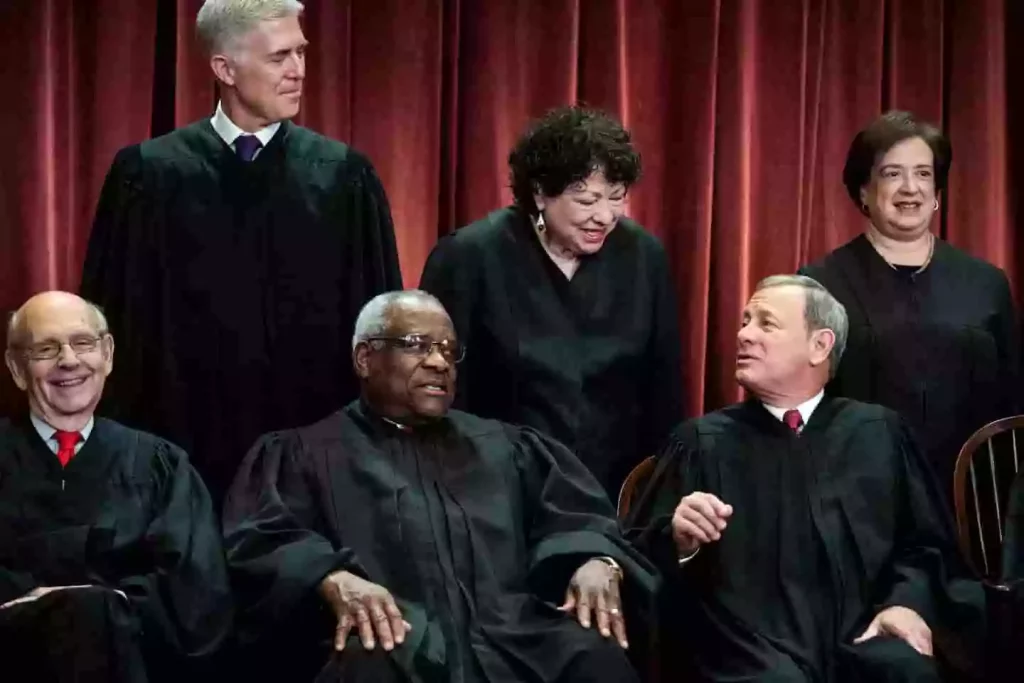
Career in Politics
Between 1979 and 1981, Thomas would work once more under John Danforth. Danforth was now a Senator, and Thomas was a part of the Senate Commerce Committee as a legislative assistant handling energy issues.
In 1981, Thomas was the Assistant Secretary of Education for the Office of Civil Rights, a part of the U.S. Department of Education. This was a part of the Reagan Administration. Thomas would later take a position as the chairman of the Equal Employment Opportunity Commission.
Thomas was a critic of affirmative action for a number of reasons. When he was at the EEOC, he refused to take part in class-action lawsuits. Rather, he went after individual cases of discrimination. Thomas also openly voiced criticism for African Americans who, in the words of Thomas, were more likely to complain about Reagan rather than work with him to “alleviate teenage pregnancy, unemployment and illiteracy.” This could be one factor in Thomas’ controversial nomination to the bench.
In 1989, President George H.W. Bush nominated Thomas to the U.S. Court of Appeals in D.C., and Thomas’ nomination was easily confirmed. When Thurgood Marshall retired, President Bush nominated Thomas for the open seat. However, Bush was warned that replacing Marshall with an African American who “was not perceived to share Marshall’s views on civil rights” would prove difficult come time for confirmation. True to this prediction, Thomas would face an uphill battle to become a confirmed Justice.
Although President Bush called Thomas “the best qualified at this time,” both feminist and civil rights groups came out against the nomination. Thomas’ comments about the EEOC and affirmative action would likely be one reason for his nomination to remain unconfirmed by the Senate. Thomas’ confirmation hearings began in September of 1991, and he appeared cool and calm during questions regarding his judicial philosophy as well as his views on legal theory. Allegations had also come out regarding Thomas’ working relationship with Anita Hill. The confirmation hearings were opened back up. Hill testified before the Judiciary Committee, and Thomas was also brought back before the Committee.
During these hearings, Clarence Thomas made his famous comment: “it (this hearing) is a high-tech lynching for uppity blacks who in any way deign to think for themselves . . .it is a message (that) unless you kowtow to an old order . . . you will be lynched, destroyed, caricatured by a committee of the U.S. Senate.”
Thomas also defended his own right to privacy as a result of the allegations. Eventually, Anita Hill was the only person to testify that Thomas had allegedly made remarks of a sexual nature to her. A former employee of Thomas, Angela Wright, declined to testify. She did, however, submit a written statement alleging that Thomas had once asked her for a date and made comments of a sexual nature in her presence, but ‘she did not feel that his behavior was intimidating, nor did she feel sexually harassed.”
Others testified on behalf of Thomas. One was a former colleague who had shared an office with Thomas and told the Senate Committee that she heard “virtually everything Thomas had said over the course of two years.” She testified that she had never heard Thomas make any type of offensive comment. She also said that Thomas and Hill could not have conducted themselves in the manner to which Hill testified “without any of the dozens of women he worked with noticing it.”
Even after the contentious confirmation hearings, Thomas was still confirmed by a vote of 52 – 48.
Today, Clarence Thomas is a quiet, highly conservative member of the Supreme Court. He is not one to give interviews, speaking rarely to the public. He is seen as a heavy influence on other conservative justices. Like Chief Justice John Roberts, Thomas does not see the Court as an instrument to make law, but rather to interpret it.
Thomas has written nearly 700 opinions during his time as a justice. He was the only Justice to dissent and voted to throw out Section Five of the Voting Rights Act of 1965 – something the Left is looking to restore with the Freedom to Vote/For the People Act, which is was recently defeated in the Senate.


